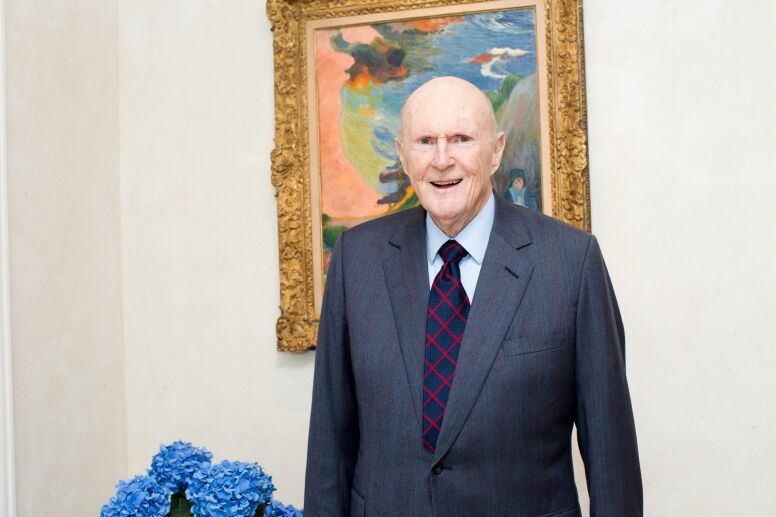News & Stories
Remembering a hedge-fund pioneer

Julian Robertson (BSBA ’55), the pioneering hedge-fund manager and founder of Tiger Management, died at the age of 90 on Aug. 23, 2022.
A titan of industry, Robertson made a lasting impact on the business world and UNC Kenan-Flagler Business School.
“We lost an extraordinary member of our community,” said Dean Doug Shackelford (BSBA ’80). “As our graduate, Julian Robertson’s success made us proud. As a leader, Julian changed his industry and contributed to his communities. And through his philanthropy, he touched many lives at UNC Kenan-Flagler and in the cities he lived.”
Robertson was a hedge-fund pioneer, a tremendous mentor and a generous philanthropist.
The Financial Times called him “one of the most influential hedge fund managers of all time” who “achieved heroic status both for his record at New York-based Tiger Management during the early days of the hedge fund industry and for the dynasty of hedge fund traders known as the ‘Tiger Cubs’ that he helped launch.”
Robertson was born in Salisbury, North Carolina, on June 25, 1932. After he graduated from Carolina, he spent two years in the U.S. Navy and then moved to New York in 1957 to join Kidder Peabody & Co., eventually becoming CEO of its asset-management arm. In 1978, Robertson and his family spent time in New Zealand, where he created three major resorts.
When they returned to New York, Robertson left Kidder Peabody and started Tiger Management in 1980 with $8 million in funds and built it into one of the world’s largest hedge funds with $21 billion under management before he closed his funds in 2000.
Forbes chose him as one of the 100 greatest living business minds in 2017. The financial press reports that almost 200 hedge firms can trace their start to Tiger Management and funds run by Tiger Cubs have earned billions of dollars for investors.
“The true success of Robertson and Tiger extends beyond the stellar performance numbers and mind-boggling assets under management,” Daniel Strachman wrote in “Julian Robertson: A Tiger in the Land of Bulls and Bears.” “Ultimately, the success of the firm can be measured in the legacy of his cubs.”
Tiger Cub Philippe Laffont, founder of Coatue Capital, said Tiger’s focus on hiring “people who were well-rounded instead of specialists” was the “special sauce” that “created a culture of people who were competitive, curious and extroverted,” according to the Financial Times.
Robertson shared what makes good portfolio managers in a 2010 UNC Kenan-Flagler alumni magazine. They have to be “smart, honest and have the courage of their conviction. In addition to that, we have found that competitiveness is an important factor.” They also need “honesty and smarts. Wall Street and the rest of the world are looking for people who want to make this a better place than it was when we arrived.”
“No shop in the history of investment management has produced more phenomenal people,” Dixon Boardman, chief executive of Optima Asset Management, who worked with Robertson at Kidder, Peabody & Co., told the Financial Times.
“We were young and hyper-competitive analysts competing against people [in other firms] who worked seven-hour days and were used to two-martini lunches,” Tiger Cub Lee Ainslie (MBA ’90), a managing director of Tiger Management before he founded Maverick Capital. “Julian was a mentor and a friend to so many people who aspire to live up to his example as both a great investor and an extraordinary philanthropist.”
John Townsend (BA ’77, MBA ’82) retired as a senior advisor with Tiger Management in 2015 after more than 30 years in investment management and banking. “He was one of the legendary investors of the last 50 years,” Townsend told Business North Carolina. “To start my career with one icon [UNC graduate Dick Jenrette] and end it with another, both from North Carolina, is a real highlight for me.”
 During his lifetime, Robertson contributed more than $2 billion to charity, according to the Financial Times. He started Tiger Foundation to support low-income New Yorkers and their families and it has provided more than $250 million in grants to help schools, employment training programs and childhood education, according to its website. “Julian Robertson is one of the few hedge fund managers I admire as much for the way he’s used his money as for the way he made it,” said George Soros, the most prominent of the hedge fund pioneers, in The New York Times in 2016, referring to his philanthropy as well as his investment culture.
During his lifetime, Robertson contributed more than $2 billion to charity, according to the Financial Times. He started Tiger Foundation to support low-income New Yorkers and their families and it has provided more than $250 million in grants to help schools, employment training programs and childhood education, according to its website. “Julian Robertson is one of the few hedge fund managers I admire as much for the way he’s used his money as for the way he made it,” said George Soros, the most prominent of the hedge fund pioneers, in The New York Times in 2016, referring to his philanthropy as well as his investment culture.
Robertson endowed a premier fellowship for our Full-Time MBA Program, which recipients reflect on in this 2018 video. Among them is Tiger Cub Dwight Anderson (MBA ’94), Ospraie Management founder, who talks about working with Robertson.
The School awarded the Alumni Leadership Award to Roberson for his exceptional career achievements in 2011, and he received the Distinguished Service Medal Citation from the UNC General Alumni Association in 2005. The award read: “Julian does credit Carolina with giving him a very good understanding of accounting. It might be too much to claim that he learned here all he needed to manage what became the world’s largest hedge fund, but he believes that those accounting courses he somehow squeezed in were an important foundation for his future success.”
That award also cited the program founded by Robertson and his late wife, Josie, in 2000, when they donated $24 million to create the Robertson Scholars Leadership Program to encourage collaboration between Carolina and Duke and promote the development of young leaders. He told The Wall Street Journal: “I have intense respect for both great institutions. But I am rooting for Carolina, of course.”
He got the idea after his son, Alex (BA ’01), matriculated at Chapel Hill and his son, Spencer, graduated from Duke a few years earlier. Alex is now president of Tiger Management and Spencer is the founder and CEO of PAVE Schools. His third son, Jay, is CEO of Robertson Lodges in New Zealand, where Robertson’s $181 million art collection will move to the Auckland Art Gallery.
Business and UNC also were family matters. His sister, Wyndham Robertson, the first female assistant managing editor at Fortune, returned to North Carolina in 1986 to become the first woman vice president in the 16-campus University of North Carolina System and served as vice president for communications for 10 years.
Read more about Julian Robertson in this New York Times article.